Porch Flex: An EXCLUSIVE interview wif Ayo Johnson
by Charles Doyle & Kristen M. Scott
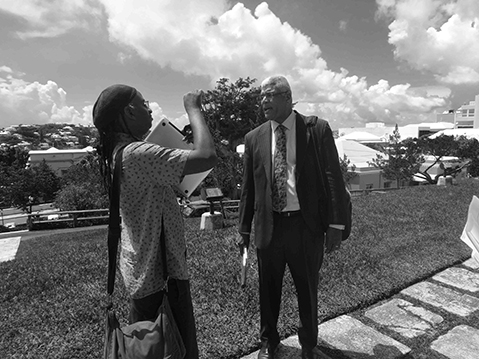
Bermemes Editor note:
“Remind yourself that you don’t have to do what everyone else is doing.”
That’s the quote on a picture I happened to stumble upon the morning before finally reviewing the document with Ayo’s interview after a long weekend. Was it a coincidence? Maybe, but the end of reading this, I knew the message was right where I needed it. I’ve never exclusively or intimately sat down and talked with Ayo as of yet, but by observation through many mediums, my first impression was that, this guy has a really has balls. On an island so small, taboo, and “loyal” it isn’t hard for you to be blacklisted because of your affiliations, your reasoning or opinion if not in agreement with others. Many people and even media may see Ayo has some sort of pestilence, but I admire his perseverance and resilience to continue to climb through this islands adverse nature. After reading, this lengthy, but compelling interview, I was reminded of our own brand here; how we are different, non-taboo, and non-traditional, I, too, have wanted to “pack it in,” but then you get that slight reminder by a passer-by or a comment on our social and you know – this is exactly what Bermuda needs. See it for yourself!
Introduction
Now more than ever, Bermuda needs fearless journalism that prioritizes accountability and facts over sensationalism and private interest. At a time of unprecedented mistrust in Government and the dominant local media that's largely viewed as being their counterpart, it can be hard to discern fact from fiction, particularly against the toxic backdrop of our partisan politics. Enter Ayo Johnson of Think Media, Bermuda's only true investigative journalist, who was kind enough to sit down with us for an exclusive interview on his latest projects and the state of journalism in Bermuda.
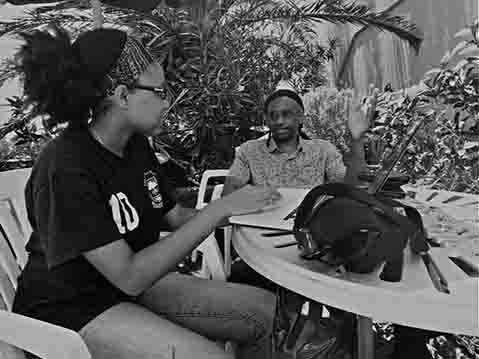
What is your background?
Sierra Leonean and Bermudian. Although I am best known in Bermuda as a journalist, I have a background in human rights advocacy, diploma in computer programming from New York University, studied filmmaking at NYU and New York Film Academy, international human rights law at Oxford University and I spend an inordinate amount of my free time learning to code in different languages and conducting data analysis.
What is your official role with Politica?
I own Think Media which publishes Politica, our first digital journal. So I am the publisher, but also the main contributor and producer at this early stage. I should take this opportunity to say we are seeking another editor to provide editorial oversight for one or two articles a week, as well as a Public Editor to address complaints from the public. But Politica is not all we’re about, just one of what we hope to be a number of journals and media projects.
So what else is Think Media up to besides Politica?
We’re working on a feature length documentary, now 12 years in the making, about the 1970s, two new television shows and a mental health advocacy/awareness campaign. We are also in the early stages of developing a major research project on birthing. And we plan on bringing more digital journals and developing a movement of independent journalism. Think Media is actually a whole new ecosystem of empowerment in the making.
Tell us more about the documentary on the 1970s
Well, the working title is “Hanging Buck” and the research covers the beginning of Bermuda’s modern political history - from the mid 60s to the late 1970s. We’re examining and investigating the dramatic moments as well as the nuances of the period.
Its actually been quite intense - but sporadic - over the years.
We were the first to submit FOI requests to the UK Foreign and Commonwealth Office when their law came into effect in 2000. We’ve done a number of on and off camera interviews here and abroad and we are now calling on the general public for any visuals or audio archival materials they may have that may be relevant. In particular we want to hear from living witnesses and key players of the events - just to make sure we cast as wide a net as possible.
Isn’t Jonathan Smith doing a book on the period and are the two projects related?
Actually, I became aware of Jonathan Smith’s book project about two and a half years ago, approached him and suggested a research collaboration of sorts because it certainly didn’t make sense to be duplicating work and while his project had, as he explained it then, a much narrower focus, I saw the two as quite complementary.
They are separate projects but we’ve given Jonathan Smith access to our research and introduced him to two of our top researchers - one of whom, Ben Greening, joined us as a summer student some years ago and was so engrossed in the project that he eventually decided to do a Phd thesis on the period.
So why has your documentary taken so long to complete?
Access to necessary resources - time and money - has been challenging. When we started thinking about this project, way back in the late 1990s, the 1970s was not talked about much and the establishment acted like it never happened. I was actively discouraged from pursuing the project by establishment figures of the day. There seemed to be a fear about publicly discussing the turbulence of those years. Or certainly an anxiety about anyone black telling the story.
Some folks would remember that Craig Looby lost his job as a radio DJ when he asked his audience “when were the last riots in Bermuda?” I dropped the project and spent the next few years building a career in journalism and getting to know Bermuda.
When I picked it up again in the early 2000s, I was able to build a research team but the funding remained elusive so we just kept on chipping away at it as and when we could.
Another reason it is taking so long is the sensitivity of the period. I’ve had to work really hard to build the right relationships to get participation from many of the living witnesses and key players. I want the film to be journalistic and grounded in solid thorough research. Given the significance of the period I did not want to take the easy way out and slap something together.
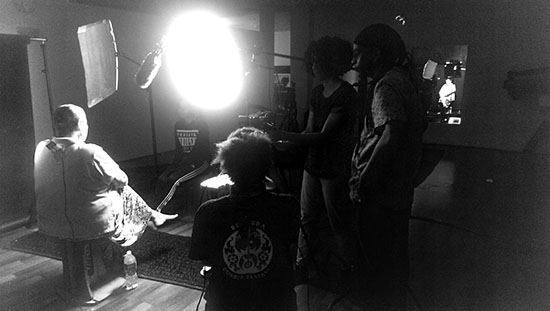
Tell us about the mental health advocacy campaign
Its something we’ve been looking at for almost a year now. People with mental illnesses are among society’s most vulnerable but we rarely hear from them or about them. We think we’ve figured out how best to correct this deficiency in a way that is respectful, empathetic and impactful.
So we’re looking for up to ten brave souls who will help us tell the world of their challenges and successes living with mental illness. We will present their stories on screen and in text alongside other information to provide context and additional substance. The project is primarily journalistic but we are taking an advocacy stance as well. We’ve been in talks with one or two organisations to help us make it happen and we think it’s important enough to collaborate with other media outlets in a way that gets the whole country talking about mental health for a sustained period.
How much of Politica would you say is unbiased journalism and how much is personal political criticism? How important do you think it is to have a journal like this to a community like Bermuda?
I rarely offer my “personal political criticism” to the public.
And I have never claimed to be “unbiased”. What we try to do is ensure that our personal prejudices do not undermine our duty to the public.
My bias as a journalist is to approach every story with a healthy dose of skepticism toward those who hold power – whether political power or otherwise. Another bias – in terms of story choice – is to protect the public interest by holding the powerful to account. But once we’ve settled on the story/topic we want to pursue we engage in a rigorous objective process. That way we can stand by our stories and be held accountable by our readers. In fact, we are the only media organisation in Bermuda that has detailed editorial policies on our website.
Our very first story – Selling Bermuda – should have established the importance of accountability journalism.
None of the legacy media organizations – or advertising-centred organisations – devoted even a tenth of the resources we put into this story.
Yet it was the most important political story since the Bermuda Housing Corporation scandal more than a decade ago.
It also had a greater impact than any other story in recent history, leading to an internal party investigation, a police investigation - which is ongoing - and the resignation of a sitting premier.
So, yes it is extremely important to have fearless, independent journalism in these types of communities – or any community for that matter. I think the nature of places like Bermuda – small and affluent, with so many interrelationships and conflicting interests - may work against the idea of independent journalism. But it is critical. It could rescue us from forty-thievery and/or its legacy.
What has happened since the controversial launch on May 7th, 2014?
Not sure why you describe the launch as “controversial”. And we’re actually still in beta mode, so it was actually a pre-launch to test ideas and acceptance. We’re now taking a break so we can figure out how to make it sustainable. But it’s been hard to do so with so many stories going under-reported and what we’ve been doing is to follow through on some of the more significant stories and gauge the public’s appreciation – or lack thereof – of our coverage of the less dramatic stories. Without doing any marketing, we’ve managed to attract a loyal audience which continues to grow organically. There’s been a lot of interest from students of journalism – interested in working with us and/or researching the field. The most important thing that has happened is that we’ve attracted some of Bermuda’s smartest and most talented people to work with us.
This journal resembles the popular Politico Magazine, the American political journalism organization—any similarities to or inspirations from the publication? (Specify) (http://www.politico.com/magazine/#.VCB0yCuwKLp)
I don’t agree that there is any resemblance between the two besides the names. I was not familiar with Politico before Politica. I am inspired by the work of journalists from places as diverse as Malaysia, Nigeria and Latin America. There’s a lot of exciting stuff happening in the so-called less developed/emerging economies. North America is actually quite disappointing in comparison – for all the disruptive potential of the technology, few of the new media startups there have taken a different path from the white male dominance championed by the legacy media.
That said, Politico has in less than a decade managed to carve out leadership role in political reporting in Washington. We hope to achieve a similar status with Politica, but our coverage goes beyond politics.
So what is Politica’s focus?
Politica is our first digital journal and its focus is human rights, governance, sustainability and politics. We are particularly interested in stories about the use, pursuit and abuse of power – whether corporate or political – and impacts on the vulnerable. We spend a lot of our time trying to learn and work with alternative forms of storytelling, so expect in the near future insightful data analyses, visualisations, and network analyses which expose systems of power and control. Its heavy stuff but we think there’s also room for some irreverence and humour every now and again. We’re not that interested in breaking news - racing to the internet with the same story as everyone else - although we will do some live coverage of some events and forums. We are most interested in adding value to the mix with original journalism, deeply reported. A lot of the shallowness that all too often passes for journalism nowadays is the result of the breaking news culture. We’d rather be right than first.
Can you tell us how you balance the reporting of the smaller political dramas of Bermuda with being able to observe and analyse the broader political patterns that these are often a symptom of?
Given limited resources, we will prioritise accountability journalism – holding the powerful to account. But we also plan to keep tabs on the “smaller political dramas” because their significance may only emerge after a period of time. Sometimes the mainstream under-reports even the smaller stuff and we might fill in the gap in coverage.
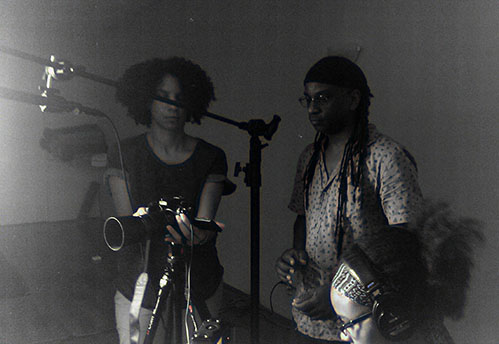
How many journalists and/or reporters are actually working with Think Media?
It varies. Last summer we had three students/interns come through – all highly intelligent, motivated young Bermudians who approached us on their own initiatives.
At the moment two of us, Alyson Thompson and myself, work on the journal and various projects on a regular basis. For special projects – like “Hanging Buck” – we call on people who have a special interest and commitment. But we are still developing a sustainable business model that preserves editorial independence. I thought it was important to bootstrap it off my savings while working out the revenue model to ensure our independence. So no one’s getting paid at the moment - we’re still in experimental mode.
Who else is involved?
Yesha Townsend, Najib Chentouf and Makeem Bartley are pressed into service every now and again.
Yesha and Makeem are excellent illustrators and artists. Najib is an awesome presenter and interviewer and has helped us out with a television pilot. Suzanne Mayall is producer/researcher. Ben Greening, now a professor of history at London School of Economics, provides insightful historical perspectives on the big stories when needed. And we are excited to have two young Bermudians - Esmeralda Zanders and Quinn Outerbridge - interning with us this summer.
This year we recruited a startup team of five to focus on product development and business strategy. We plan to announce a five member strategic advisory board as well as a Guest Editor and Public Editor in the near future. But there are others who we call on on an ad hoc basis for advice.
What has been the audience response to your price points? In your opinion is it a successful strategy?
We have been experimenting with different price points over the last year. Our experiments validate what we learned in our pre-launch research – that there is currently considerable resistance to paying for any kind of content online.
For example, Politica’s launch story – Selling Bermuda – which was a 6,000 word piece that took several months to research and verify was read by thousands of Bermuda residents. The vast majority of them found ways to access it without paying the $3 we charged – in violation of our terms of service. One organization, for example, emailed the story to all of its members – hundreds of people. The real cost of this is that we were unable to fund a summer training programme – which would have kept four young Bermudians gainfully engaged for three good months.
That said, we had been advised to copy protect our content. We chose not to – for two reasons. Firstly, it seemed a little unseemly to set up a conflict with the very people whose interests we are trying to serve. Secondly, we were and are in the research and product development stage. We wanted to see what would happen and make adjustments accordingly.
There is, however, a small minority of people who will pay significantly more than what we have been charging from time to time and are eager for us to begin offering more convenient ways to pay such as a yearly subscription and a membership programme. Obviously, we would have to ensure that we have the capacity to generate the expected volume and frequency, so we are looking closely at funding options to expand capacity. Ultimately, we will offer a membership programme which will have a series of levels and accommodate multiple market segments – even those who would rather not pay directly for access to the content.
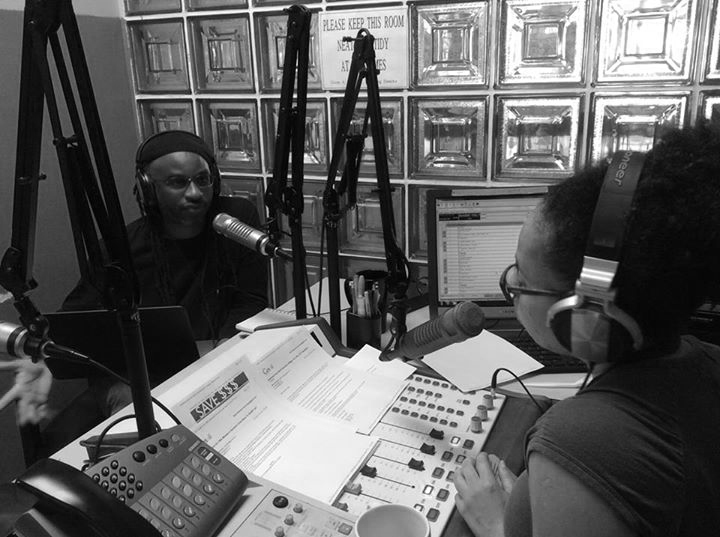
What has been your biggest disappointment over the last year?
That would have to be the behavior of one or two civil servants acting under the misguided impression that their job is to protect politicians from any kind of scrutiny. Their pathetic tactics include dropping us from the mailing list, failing to inform us of important media events, and not even acknowledging emailed queries. I’ve made two reports to the Cabinet Secretary and three to the Premier, and considering a complaint to the Ombudsman. Hopefully it will get better and they will come to realise that prostrating in their GQ outfits in front of people with fleeting titles is not the kind of public “service” this country deserves.
Since the launch of Politica, and in the months leading up to it, I have been treated with hostility by certain politicians. One Government Minister – Michael Fahy - apparently has a policy to ignore every single emailed query from myself. I think he imagines he is treating me with contempt, when in fact he is treating the public – whom we both serve – with contempt. One or two others, I am told, have decided to adopt the same policy.
It boggles the mind that any politician today thinks he can afford to treat the public with contempt, but there you have it.
Then you have party consultants like Magnus Henagulph who advised governing party MPs not to cooperate with one of my projects while pretending to us that he was trying to facilitate the same project.
You have to do your part to address this as a political reporter in a small society because without relationships of mutual respect, it’s difficult to be as effective as one could be. But it has to be addressed without compromising your integrity, without making promises that are counter to the public interest – just to get an interview or a story. It’s walking a tightrope.
Given all this hostility, have you ever felt like packing it in?
Yes.
What keeps you going?
We’ve only just started! Why stop now?
On a daily basis, ordinary folks let me know directly that they appreciate what we are doing and trying to achieve. The challenge now is to turn that goodwill into financial sustainability.
But I’m also aware that we have not even begun to scratch the surface of our potential. A big part of our raison d’etre, for example, is empowering the vulnerable so we need to redouble our efforts in that regard. We also want to get into solutions journalism - where we identify social problems alongside efforts to solve them and examine the results of those efforts. So there’s lots to get on with.
As for the politicians, it is obvious that some of them reckon that by ignoring our questions/requests for interviews they undermine our work. That’s a flawed proposition, actually. Because our duty is to give everyone an opportunity to reply - especially to adverse commentary. We go over and beyond by extending multiple such opportunities over extended periods. We prefer their participation, and stories are generally richer for it but ultimately it’s their call. For our part we will be as transparent as possible with the process and let our audience know what questions were asked and not answered. At that point it is on them.
What are you doing on your break?
Building capacity - through training, workshops and apprenticeships - and product development/design. We’ve had four interns join us this summer and two are still with us. We have also been focusing on our other projects - such as the documentary and the mental health advocacy campaign. And, of course, exploring financing options for the business as a whole and the various projects.
What are your predictions about the media in Bermuda?
In the near future all news outlets in Bermuda will be online only and reader subscriptions will be part of the mix. So we are happy to be the pioneers and make the sacrifices that entails.
My guess is that once the daily starts to do it, reader supported media will gain mainstream acceptance.
I think more people will try to launch new ventures and am hoping that we will find a way to work together to improve the industry and empower each other.
The RG will continue to lose its dominance as the alternatives rise to the challenge of filling in the gaps that have existed in local journalism for decades.
Having appointed its first black editor, the daily will pretend it’s not the same organization it has been for the last 180 years as it strips the role of any real power and independence.
Its of critical importance that those trying to build alternatives are supported no matter what business model is pursued. Whether that happens remains to be seen, but I’m hopeful.
For our part, we are about to finalise our business model which will incorporate multiple revenue streams of which advertising will be a small part.
We will step up our efforts to be the most respected media organization around.
Where do Sierra Leone and the rest of West Africa fit into your career?
It’s where I first learned the power and importance of the media many years ago and the source of much of my inspiration in so many ways.
My father published a political bulletin called Think which he printed on a gestetner and for which he was the main reporter and editor. He was one of the hardest working people I have ever known, waking in the wee hours of the morning to print the paper and then hand it out to passers by before heading off to tend to his law practice. Think was an outlet for free, independent thinkers and dad also used it to give voice to Sierra Leone’s vulnerable and campaign against anti-democratic measures of the state.
A student demonstration at the University of Sierra Leone ended with state property destroyed and the Mayor of Freetown having to make a hasty departure with her English guest through the forest surrounding the campus. As we waited for retaliation from the security forces that night, I was shocked to hear state radio tell the country on the evening news that we had warmly welcomed our guests. It took a while for the truth of the situation to filter through to the rest of the population. Some months later, I ended up starting a production company CineAfrica Productions. I had no idea what I was doing but we began shooting short stories with customers at my restaurant (for free wine) and playing them at the bar. To watch people see themselves on the screen for the first time was an eye opener. I decided to leave the country and see if I could learn how to make films. (My life went downhill from there!)
The media in Sierra Leone is much more diverse now but not unlike Bermuda, is in a state of weakness if not complete disrepair. There’s a huge gap to be filled in both countries.
What more do you need from Bermuda to help push the success of this journal?
Constructive criticism and engagement. About 3,000 pioneers to sustain us for at least one or two years so we can employ people and fulfill the vision. We will be making a concerted effort over the next few months to find those people, tell them of our value proposition, and invite them to take the journey with us. That said, I think we’ve demonstrated the kind of value we can add to the mix and earned the support of many in this community.
A good place to start, for those who want to join us on the journey, is to subscribe to our newsletter on Politica which can be found at http://www.think.bm
What piece of advice can you give to our aspiring political journalists?
Try everything else first! Read and study journalism that impresses you and get yourself a mentor.
The aspiring journalist would already be familiar with all the good, positive reasons to do this work. But I think its only fair to give them the benefit of my experience and tell them about some of the downfalls.
I would say consider your personal attributes and tolerance threshold for bullshit, hostility and blacklisting.
Consider carefully that you will probably find yourself socially ostracized, especially at times of heightened political tensions. You will lose friends, even your relatives might look at you askew and you will most likely be broke most of the time.
No matter how fair and impartial you are, you will be defamed and accused of all sorts of ulterior motives by political partisans when you write a story that reflects badly on their favored party or politician.
You might even have politicians stand up in the nation’s legislature and spout what they know to be lies about you personally.
If you can handle this, and if you have the relevant skills, interest, curiosity and sense of purpose, then go for it.
If you’re going to do it fearlessly, a certain detachment from the day to day politics and your own ego is necessary to maintain your center.
It’s also important to realize that being wrong or inaccurate is not an option. Definitely don’t be black and wrong. Legacy media reporters today can get it wrong multiple times without consequence. Choose to be independent and just know there are many people sitting on the sidelines waiting for you to fail.
The proof of your worth as a journalist is how well you defend the public interest and how relentlessly you pursue the truth. And that often depends on your mental and emotional stamina and personal integrity.
If you desire to read more of Ayo's work you can visit Think Media or folow them on twitter for live updates
- Tags: #PorchFlex, Bermuda, Bermudians, De Blog, Kulcha, OBA, PLP, Politics
